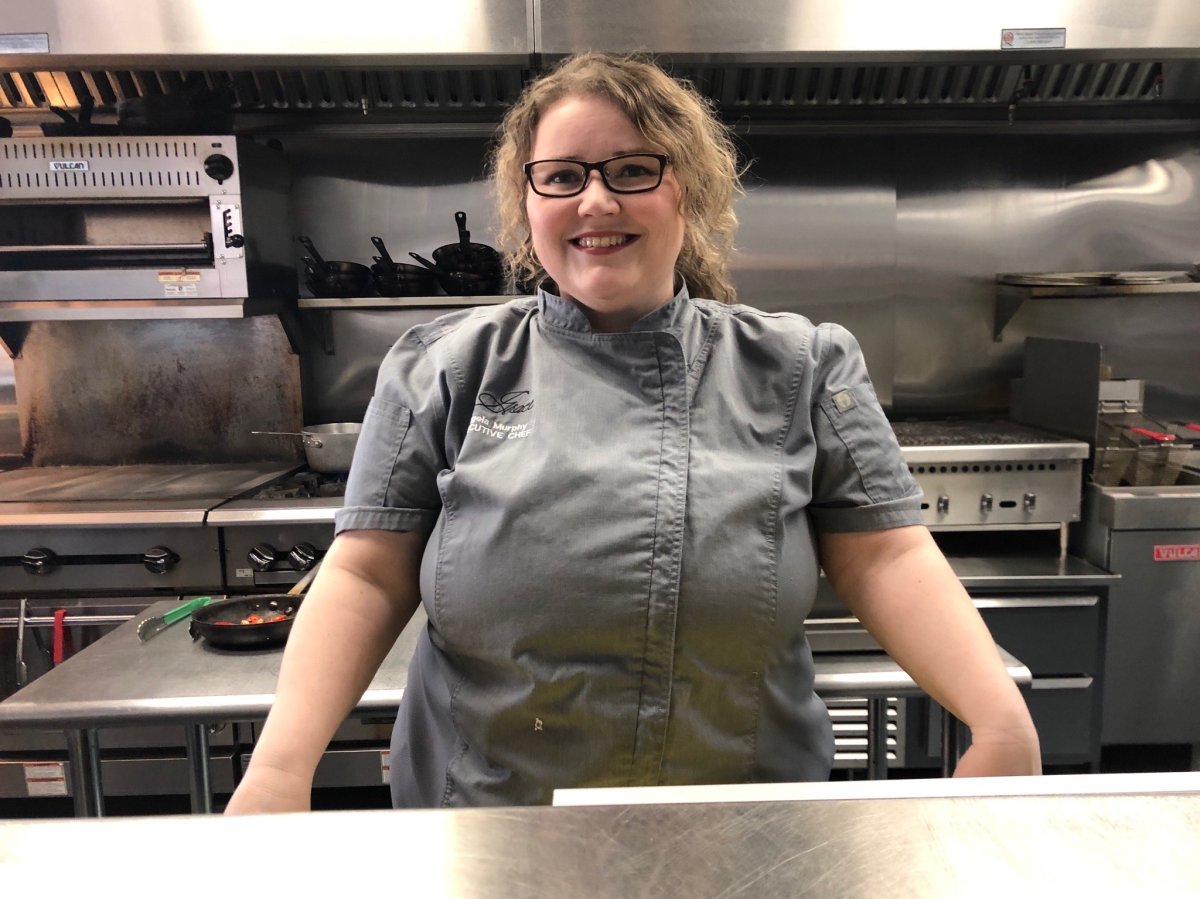International Women’s Day March 8 is a good time to look at the inspiring women around the world, and what better place to start than right here in London, Ont.

Global News spoke to three female entrepreneurs in the Forest City who are paving their own paths.
Angela Murphy, 34 – Grace Restaurant
“I Just wanted to create a space more in line with my food philosophy, my social ethics, my community-minded spirit, and a great place for talented young chefs to come and work,” Angela Murphy said.
Murphy, 34, is the owner and executive chef of Grace Restaurant on Dundas Street in downtown London.
The restaurant opened its doors nine months ago, serving modern Canadian cuisine utilizing the farm-to-table approach, relying on locally-sourced ingredients.
“We are working with local produce, whole products — not stuff out of a box,” she said. “Everything we do is made from scratch … we also do a good amount of stuff in-house — like we make our own ricotta and cure our own fish.”
Having worked in the food industry for many years, she talked about the importance of moving away from the ‘machismo culture’ of running a kitchen.
“Everyone should have a chance to contribute something, and develop and grow,” Murphy said. “This is an art form, it’s not a factory, so let’s not treat our staff like they are pumping out food for someone else’s benefit.”
Working with a team of 18, part of the supportive environment she tries to foster includes making sure everyone, including service staff, is paid above regular minimum wage. The majority of her staff are also employed full time.
“They feel like their ideas are heard. We’re interested in taking a few risks outside of the typical London menu,” she said. “We are willing to do other stuff, and I think it’s really catching on and that draws in a certain set of talent.”
The name Grace comes from Murphy’s grandmother, whose ‘ethics’ and ‘perspective’ are at the heart of the restaurant, Murphy says.
Murphy admits that starting a restaurant was not something she thought she would ever have the resources to do.
“The whole process was stressful, exhausting, very hard, not what I imagined, and no matter what you think you’re ready for, you’re not.”
“I wrote a business plan, I found investors, I had some of my own capital, and I made it work.”
Looking to the future, Murphy is encouraged by the number of people leaving Toronto for more affordable places to live, adding people don’t have to sacrifice culture, art, and cuisine in moving to London.

Janet Antone, 31 – Ms. Antone’s Beadwork
Janet Antone has turned what first started as a form of art therapy into a full-time job that allows her to reclaim her culture and be a voice for Indigenous women in the fashion industry.
“Beadwork has always been a part of Indigenous history,” Antone said. “For me, a big part of connecting with it is the reclamation of the beading practice.”
A member of the Oneida Nation of Thames, Antone explains that as a form of assimilation until the 1950s, First Nations people were banned from practicing cultural things like beading. She said part of why she learned is so she can pass it on to future generations.
Antone makes one of a kind beaded earrings as well as other jewelry and embroidery that she sells online and at local events. She also has jewelry making workshops where she teaches others.
She said over time, her hobby grew into what is now a profitable business, thanks to the connections she developed.
“I don’t like calling them customers. All of them end up becoming friends and familiar faces.”
Although Indigenous-made, Antone explains that she tries to keep all of her designs contemporary, so they are accessible for everyone.
“There have been a lot of native-inspired pieces that pop up, made by non-Indigenous people. So, for myself, keeping my work contemporary also helps people who want to support Indigenous businesses.”
Her jewelry typically ranges in price from $45 to $150 depending on the product and design.
The main product Antone creates are earrings, but she said she has also experimented with things like baseball caps and custom embroidered items.
“I am always experimenting.”
As well as creating, Antone explains that she also developed an Indigenous pop-up market to bring together rural and urban Indigenous communities as well as the ally community.
Nicole Baranowski, 22 – Hairstrong
Still in school, 22-year old Nicole Baranowski is already turning a profit with her startup hair scrunchies business, Hairstrong.
The idea stemmed from an entrepreneurship class at Western University, where she said students created a business plan towards a fictitious company.
Baranowski said her plan caught the attention of the University’s entrepreneurship centre that set her up with the resources she needed to turn her school assignment into a real business.
“When I was stuck at a roadblock or an obstacle they were there to guide me along the way,” Baranowski said.
Baranowski makes two adjustable hair scrunchies that she said eliminates the problem of hair ties failing out or causing damage by being too tight and pulling on hair.
She sells them at the Western Book Store, London Dance Shop, and online for $24 and $28.
Baranowski said because she uses student loans to support herself, she has been able to put all of her profits back into the company to help it grow.
“It has been a proud accomplishment to break even and not be in debt, in terms of the business,” she said.
Moving forward, Baranowski said she hopes to expand her business into more retail stores and have all athletes with long hair wearing her product.
“Since starting this business, I have met a lot of other female entrepreneurs that have been incredible and have been happy to help other women succeed, and I don’t think I would have met these women if it weren’t for this business.”
For other young entrepreneurs, she said it’s important to note that although it’s her own business, she has never been alone and is grateful for all of the people helping her get ahead.














Comments